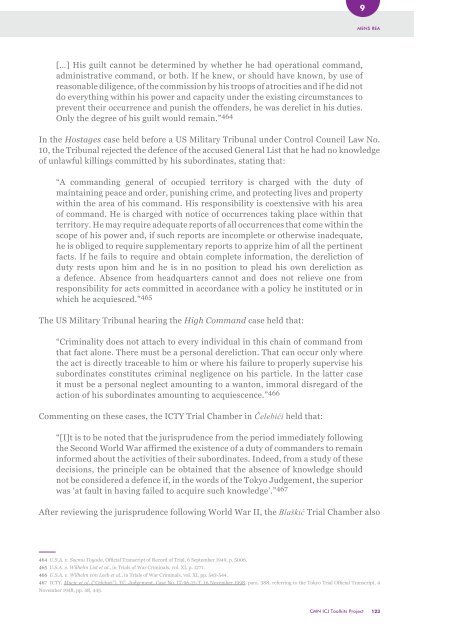Command Responsibility
CMN_ICL_Guidelines_Command_Responsibility_En
CMN_ICL_Guidelines_Command_Responsibility_En
Create successful ePaper yourself
Turn your PDF publications into a flip-book with our unique Google optimized e-Paper software.
9<br />
MENS REA<br />
[…] His guilt cannot be determined by whether he had operational command,<br />
administrative command, or both. If he knew, or should have known, by use of<br />
reasonable diligence, of the commission by his troops of atrocities and if he did not<br />
do everything within his power and capacity under the existing circumstances to<br />
prevent their occurrence and punish the offenders, he was derelict in his duties.<br />
Only the degree of his guilt would remain.” 464<br />
In the Hostages case held before a US Military Tribunal under Control Council Law No.<br />
10, the Tribunal rejected the defence of the accused General List that he had no knowledge<br />
of unlawful killings committed by his subordinates, stating that:<br />
“A commanding general of occupied territory is charged with the duty of<br />
maintaining peace and order, punishing crime, and protecting lives and property<br />
within the area of his command. His responsibility is coextensive with his area<br />
of command. He is charged with notice of occurrences taking place within that<br />
territory. He may require adequate reports of all occurrences that come within the<br />
scope of his power and, if such reports are incomplete or otherwise inadequate,<br />
he is obliged to require supplementary reports to apprize him of all the pertinent<br />
facts. If he fails to require and obtain complete information, the dereliction of<br />
duty rests upon him and he is in no position to plead his own dereliction as<br />
a defence. Absence from headquarters cannot and does not relieve one from<br />
responsibility for acts committed in accordance with a policy he instituted or in<br />
which he acquiesced.” 465<br />
The US Military Tribunal hearing the High <strong>Command</strong> case held that:<br />
“Criminality does not attach to every individual in this chain of command from<br />
that fact alone. There must be a personal dereliction. That can occur only where<br />
the act is directly traceable to him or where his failure to properly supervise his<br />
subordinates constitutes criminal negligence on his particle. In the latter case<br />
it must be a personal neglect amounting to a wanton, immoral disregard of the<br />
action of his subordinates amounting to acquiescence.” 466<br />
Commenting on these cases, the ICTY Trial Chamber in Čelebići held that:<br />
“[I]t is to be noted that the jurisprudence from the period immediately following<br />
the Second World War affirmed the existence of a duty of commanders to remain<br />
informed about the activities of their subordinates. Indeed, from a study of these<br />
decisions, the principle can be obtained that the absence of knowledge should<br />
not be considered a defence if, in the words of the Tokyo Judgement, the superior<br />
was ‘at fault in having failed to acquire such knowledge’.” 467<br />
After reviewing the jurisprudence following World War II, the Blaškić Trial Chamber also<br />
464 U.S.A. v. Soemu Toyoda, Official Transcript of Record of Trial, 6 September 1949, p. 5006.<br />
465 U.S.A. v. Wilhelm List et al., in Trials of War Criminals, vol. XI, p. 1271.<br />
466 U.S.A. v. Wilhelm von Leeb et al., in Trials of War Criminals, vol. XI, pp. 543-544.<br />
467 ICTY, Mucic et al. (“Celebici”), TC, Judgement, Case No. IT-96-21-T, 16 November 1998, para. 388; referring to the Tokyo Trial Official Transcript, 4<br />
November 1948, pp. 48, 445.<br />
CMN ICJ Toolkits Project<br />
123


